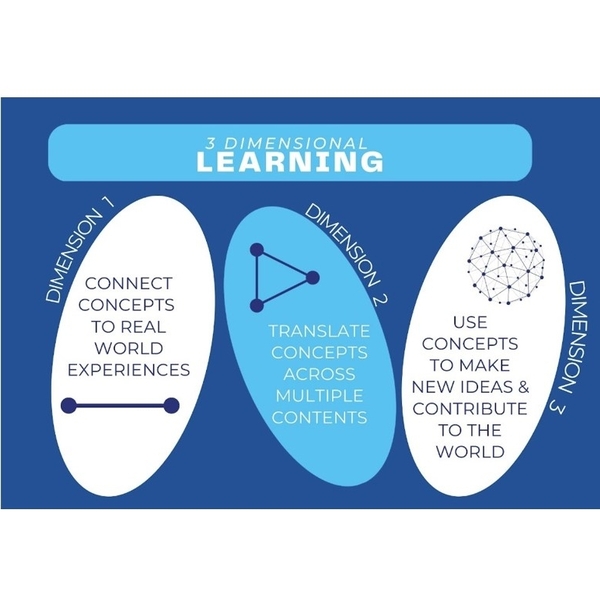3-D Learning

The SA Upper School values purposeful preparation for life after graduation. This blog is the second in a series highlighting the many ways in which the SA Upper School’s design successfully launches students into their post-graduation plans.
The traditional schooling instructional model is very linear. One might even say it’s unidimensional:
- Teachers give students facts/processes to remember.
- Students practice reciting facts/processes mimicking the teacher.
- Students complete assessments recalling those facts/processes.
By contrast, at the Upper School we teach by building ideas and connections so learning takes a three-dimensional shape. Here’s how:
Dimension 1: Students discover facts and concepts often through real-world experiences.
Dimension 2: Students connect those ideas across multiple contents considering them from many perspectives.
Dimension 3: Students develop new applications or perspectives on the concepts and display this work in their portfolio.
This three-dimensional work is made possible through the school’s downtown location, our intentional cross-curricular work, and assessment through real-world challenges. Not only does the three-dimensional model assure students’ knowledge and understanding is deep and meaningful, but it enhances our students’ critical and creative thinking skills as well!
OK - but is that really what colleges want?
Even though this 3D approach seems exciting and engaging, I’ve often been asked: “Is this really what colleges look for? I thought it was about ACT scores and transcripts.” Or, “3D instruction is nice, but don’t colleges still teach classes in isolation?”
It is true that colleges appreciate a high ACT score and that their courses might still fall under traditional subject area categories. But it is not true that colleges and universities look at learning in isolation.
In fact, most colleges and universities have designed cross-curricular general education experiences for the undergraduates, specifically built on the critical and creative thinking skills they recognize as important in today’s world.
Specific Examples - Duke and UNC
Take for example this quote from Duke University’s Academic Pillars:
“Duke’s academic philosophy helps develop innovation by encouraging you to shape your own experience, to think way outside the box, to practice what you’re learning outside the classroom, all over the world….Trinity College classes span the arts, humanities, natural sciences, and social sciences to encourage you to think deeply within disciplines and broadly across them, with a healthy balance of tradition and innovation”
UNC Chapel Hill recently rebranded their entire undergraduate general education curriculum as IDEAs in Action. UNC’s website states that in the general education experience:
“No two of you will follow the same path, but each of you will develop the habits of mind and skills that will prepare you to contribute in a fast-changing world as a citizen, scholar, community member and leader”.
All UNC undergraduates will take an Ideas, Information, and Inquiry (Triple-I) course which addresses 3 dimensional concepts like ethics & public policy or understanding health & happiness. Triple-I courses are taught by three professors, each from a different content area. UNC explains “Triple-I courses demonstrate the power of multi-disciplinary thinking in an increasingly complex world.”
Multidimensional Perspectives at Catawba
Catawba College, our partner for dual-enrollment, also embraces the importance of learning concepts from various perspectives. Their general education program requires courses that address learning from historical & social, creative, interpretive, scientific, or non-western perspectives.
The SA instructional design not only aligns with the learning expectations students will encounter in college. - It will help them excel in these spaces of cross-curricular and innovative thinking.
Other college/university programs to explore:
Stanford - General education is addressed through “ways” of doing instead of strict content guidelines.
Williams College - Instead of minors, they have concentrations, which are “groupings of courses around certain topics that pull from many departments and disciplines (like cognitive science, which has elements of psychology, computer science, philosophy, math, and more).”
University of Pennsylvania - General education is addressed through Foundational Approaches courses and Sectors of Knowledge courses to “tailor your own education in the arts and sciences while gaining valuable knowledge across a broad range of disciplines.”
Elon University - offers a core curriculum of connected courses because “Success in a rapidly changing, interconnected world requires the ability to think broadly, critically, and creatively across many disciplines.”
